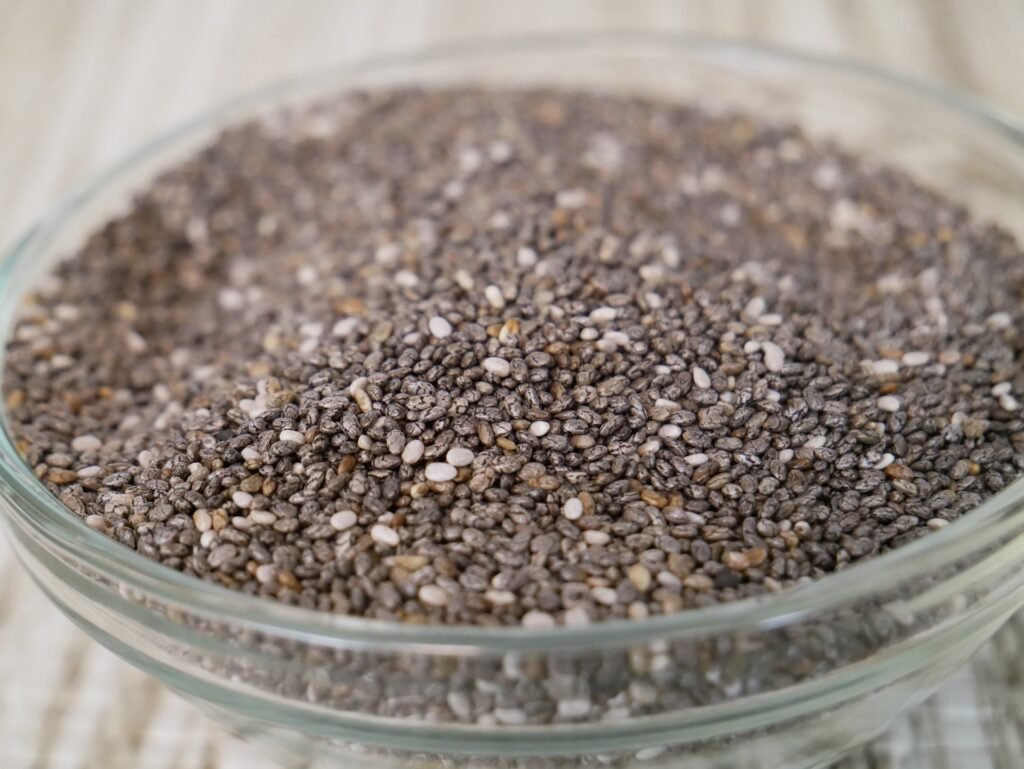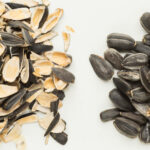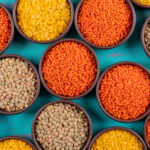
Table of Contents
Overview
Chia seeds have gained significant popularity in recent years due to their impressive nutritional profile and health benefits. Derived from the plant Salvia hispanica, chia seeds were a staple in ancient civilizations like the Aztecs and Mayans, valued for their ability to provide long-lasting energy. Today, they are recognized as one of the most nutrient-dense superfoods, offering a wide range of benefits that can support overall health and wellness.
In this article, we’ll explore the many advantages of chia seeds, how they can improve your well-being, and easy ways to incorporate them into your daily diet.
Nutritional Facts
Chia seeds may be small, but they pack an impressive nutritional punch. Just two tablespoons (about 28 grams) of chia seeds provide a significant amount of nutrients:
- Fiber: 11 grams
- Protein: 4 grams
- Fat: 9 grams (with 5 grams of omega-3 fatty acids)
- Calcium: 18% of the recommended daily intake (RDI)
- Magnesium: 30% of the RDI
- Phosphorus: 27% of the RDI
They are also rich in antioxidants and essential minerals like zinc, potassium, and iron. Because they are low in calories and high in fiber and protein, chia seeds are often used in diets focused on weight loss, heart health, and improving overall nutritional intake.
Health Benefits of Chia Seeds
1. Supports Heart Health
Chia seeds are rich in omega-3 fatty acids, particularly alpha-linolenic acid (ALA), which have been shown to support heart health. Omega-3s help reduce inflammation in the body, lower bad cholesterol levels (LDL), and prevent the formation of blood clots. Studies suggest that consuming chia seeds regularly can reduce the risk of cardiovascular diseases by promoting better blood pressure and improving overall cholesterol profiles.
2. Promotes Digestive Health
One of the standout benefits of chia seeds is their high fiber content. Fiber is essential for maintaining a healthy digestive system, as it promotes regular bowel movements and prevents constipation. The fiber in chia seeds also acts as a prebiotic, feeding beneficial gut bacteria that support digestion and overall gut health. Additionally, when mixed with liquid, chia seeds form a gel-like consistency that helps to regulate digestion and smooth the passage of food through the intestines.
3. Aids in Weight Loss
For those looking to manage or reduce their weight, chia seeds can be a valuable tool. Their high fiber content helps you feel full and satisfied for longer periods, reducing the likelihood of overeating or snacking on unhealthy foods. Because chia seeds absorb water and expand in the stomach, they create a sense of fullness that can help curb hunger. Additionally, the slow digestion of chia seeds helps maintain stable blood sugar levels, reducing cravings and energy crashes
Related: health benefits of chia seed water
4. Provides Long-Lasting Energy
Chia seeds were used by ancient civilizations as a source of sustained energy. Today, they remain a popular choice for athletes and active individuals due to their balance of protein, fiber, and healthy fats. The combination of these macronutrients provides a steady release of energy, making chia seeds a great addition to pre-workout meals or snacks.
5. Supports Bone Health
Chia seeds are an excellent plant-based source of calcium, magnesium, and phosphorus, all of which are essential for maintaining strong bones. Just one ounce of chia seeds contains about 18% of the daily recommended intake of calcium, making them a fantastic option for people who don’t consume dairy. Magnesium and phosphorus also play critical roles in bone strength and the prevention of bone-related diseases like osteoporosis.
6. Rich in Antioxidants
Chia seeds are packed with powerful antioxidants that protect the body from free radicals, which can cause oxidative stress and lead to chronic diseases like cancer and heart disease. Antioxidants neutralize these free radicals, reducing inflammation and preventing cell damage. The high antioxidant content of chia seeds also helps to extend their shelf life, making them a long-lasting pantry staple.
How to Incorporate Chia Seeds into Your Diet
One of the great things about chia seeds is their versatility in the kitchen. Their mild flavor and ability to absorb liquid make them an excellent addition to a variety of dishes. Here are some simple ways to add chia seeds to your meals:
- Chia Pudding: Combine chia seeds with your favorite milk (such as almond, coconut, or oat milk) and let it sit overnight to form a creamy, pudding-like texture. Top with fresh fruit, nuts, or honey for added flavor.
- Smoothies: Blend a tablespoon of chia seeds into your morning smoothie for an extra boost of fiber and omega-3s.
- Oatmeal: Sprinkle chia seeds over your oatmeal or cereal to add a crunchy texture and extra nutrients.
- Baking: Add chia seeds to homemade bread, muffins, or cookies for a healthy twist.
- Salads: Mix chia seeds into salad dressings or sprinkle them over your favorite greens for added crunch and nutrition.
- Yogurt: Stir chia seeds into yogurt for a nutritious, filling snack that can help you stay satisfied between meals.
Tips for Using Chia Seeds
- Hydrate Before Eating: Chia seeds absorb a lot of water and expand when mixed with liquids. It’s a good idea to soak them before consuming to prevent any digestive discomfort and to enjoy the gel-like texture they create.
- Start Small: If you’re new to chia seeds, start by adding small amounts to your diet, as their high fiber content can take time to adjust to.
- Store Properly: Chia seeds have a long shelf life, but it’s important to store them in an airtight container in a cool, dry place to maintain their freshness.
The Takeaway
Chia seeds are a nutrient-dense superfood that can provide a wide range of health benefits. From improving heart health and digestion to supporting weight loss and boosting energy, chia seeds are a versatile and valuable addition to any diet. Their high content of omega-3 fatty acids, fiber, protein, and essential minerals makes them a powerful tool for enhancing overall well-being.
Incorporating chia seeds into your meals is simple and easy, whether you’re blending them into smoothies, making chia pudding, or sprinkling them over salads and yogurt. Try adding chia seeds to your daily routine and experience the health benefits of this ancient superfood firsthand
Frequently Asked Questions
FAQs About Chia Seeds
- What are the health benefits of chia seeds?
Chia seeds are packed with nutrients, including omega-3 fatty acids, fiber, protein, and essential minerals like calcium and magnesium. They help support heart health, improve digestion, aid in weight loss, provide long-lasting energy, and promote bone health. - How much chia seeds should I eat per day?
It is generally recommended to consume about 1-2 tablespoons of chia seeds daily. Starting with smaller amounts is advisable, especially for those new to chia seeds, as they are high in fiber. - Do chia seeds help with weight loss?
Yes, chia seeds can aid in weight loss due to their high fiber content, which helps you feel full longer. They also absorb water, expanding in the stomach to reduce hunger and prevent overeating. - How should I store chia seeds?
Chia seeds should be stored in an airtight container in a cool, dry place, such as a pantry. When stored properly, they have a long shelf life and can last up to two years. - Can I eat chia seeds raw, or do they need to be soaked?
You can eat chia seeds raw, but soaking them in liquid before consuming helps them expand, improving digestion and enhancing their nutritional benefits. Soaked chia seeds form a gel-like consistency that is easy to digest. - Are chia seeds safe for everyone?
Chia seeds are generally safe for most people, but those with digestive issues or allergies should consult a healthcare provider before adding them to their diet. Always start with small amounts and increase gradually to avoid any potential discomfort.











